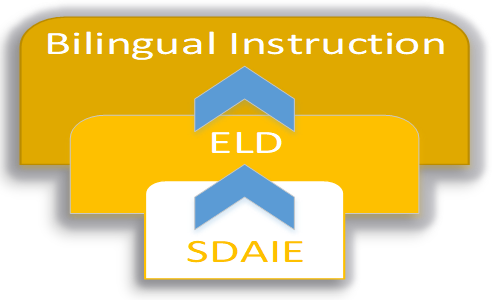During the assignment monitoring process, employers may find that some educators lack the necessary authorization(s) to serve English learners or bilingual students. This document provides a list of credentialing options available to assist employers
in remedying this type of teacher misassignment.
It is a misassignment if an educator without an appropriate authorization has even one English learner student in their classroom. There are gradients of need among English learners,
and educators are misassigned if the authorizations they hold are not aligned with the needs of the students they serve.
| Bilingual Instruction | Authorizes the educator to provide instruction in the student's native language | BA** |
|---|---|---|
| English Language Development (ELD) | Authorizes educators to develop the English language among students designated as English learners (ELs) - authorization can be used in stand alone classes, and/or integrated into other instructional settings | ELA1, SA12 |
| Specially Designed Academic Instruction in English (SDAIE) | Authorizes educators to offer EL instruction within the specific content area authorized on credential and is intended to provide scaffolding so that the EL students can access and comprehend the curriculum. Some ELD occurs within the context of the specific curriculum area only, not as a separate departmentalized instruction area. | BA**, ELA1, SA12, ELAS, ELAM, ELAE |

As well, these authorization are tiered, with Bilingual Instruction at the top of the hierarchy. Each subsequent authorization is subsumed within the higher authorization level. Because of this, educators who hold a Bilingual authorization can also provide ELD and SDAIE to their students, and so on. Additional information can be found in CL-622.
Credentialing Options: Bilingual Instruction
Full Bilingual Authorizations
Educators who hold full – non-emergency or intern – prerequisite credentials and English Learner Authorizations may acquire the full bilingual authorization through coursework at a Commission-approved bilingual program, passage of the appropriate California Subject Examinations for Teachers (CSET) exams, or a combination of both. Additional information can be found in CL-628b.
Emergency Bilingual Authorization
This document can be requested by any employing agency that has submitted an annual Declaration of Need for Fully Qualified Educators (CL-500). It allows educators to hold a bilingual authorization while they work towards completing the requirements of the full authorization. This option is available to full teaching or services credential holders with a special class authorization. Emergency permit and intern credential holders are not eligible, though a bilingual authorization may also be added directly to these documents if requirements are met. For more information on obtaining this permit, see CL-533o-CLAD-BL.
Credentialing Options: English Language Development
Full English Learner Authorization/CLAD Certificate
Educators may acquire the full English Learner Authorization through coursework at a
Commission-approved program, passage of the appropriate California Subject Examinations for Teachers (CSET) exams, or a combination of both. Additional information can be found in CL-628C.
Adding a Full Single Subject Authorization in World Language: English Language Development (ELD)
The World Language: ELD content area authorizes departmentalized ELD instruction including reading, writing, listening, and speaking, for additional content areas added or any other basic credential held. This content area can be added to General (GT*) or Standard Teaching (ST**) Credentials without holding a requisite English learner authorization. They can do this through Commission approved subject-matter programs or by verifying subject-matter competence through examinations (CL-674S). Additional information on earning this authorization can be found in CL-621 for Standard or General or CL-621a for Single Subject and Multiple Subject Credentials.
Emergency Cross-cultural, Language, and Academic Development Permit
This document can be requested by any employing agency that has submitted an annual Declaration of Need for Fully Qualified Educators (CL-500). This option is available to full teaching or services credential holders with a special class authorization. Emergency permit and intern credential holders are not eligible though they may have an English learner authorization added to their document directly. For more information on obtaining this permit, see CL-533o-CLAD-BL.
Credentialing Options: Specially Designed Academic Instruction in English
Certificate of Completion of Staff Development (CCSD)
This option is available to Designated Subject Teaching Credential holders and Service Credential holders with special class authorizations. These certificates can be obtained through completion of a 45-hour staff development program or through a coursework evaluation by a Commission-approved CTEL program. Additional information can be found in CL-824.
This document served as the Commission's predominant English learner authorization for previous iterations of general education and special education teaching credentials. Even though the document's purpose has shifted towards services in designated subjects classrooms, the intention should be honored as provided by Education Code §44251.2.
Other Options
Coursework and Subsequent Recommendation from Institution of Higher Education
Educators from out-of-state or those who earned previous iterations of California credentials may have taken coursework towards serving English learners or bilingual students without earning an authorization. In these cases, the educator can have their coursework evaluated by a Commission-approved CTEL program. If the educator has completed the necessary requirements, they may be recommended for an English Learner Authorization. If they have additional requirements to meet, they can work with the program sponsor to determine missing components, and fulfill them through coursework or examinations. Please refer to our list of Commission approved CTEL programs.
There are No Local Assignment Options in existence that allow educators to temporarily acquire or waive these authorizations.
.png?sfvrsn=c28b72b1_10)
.png?sfvrsn=cd8b72b1_0)